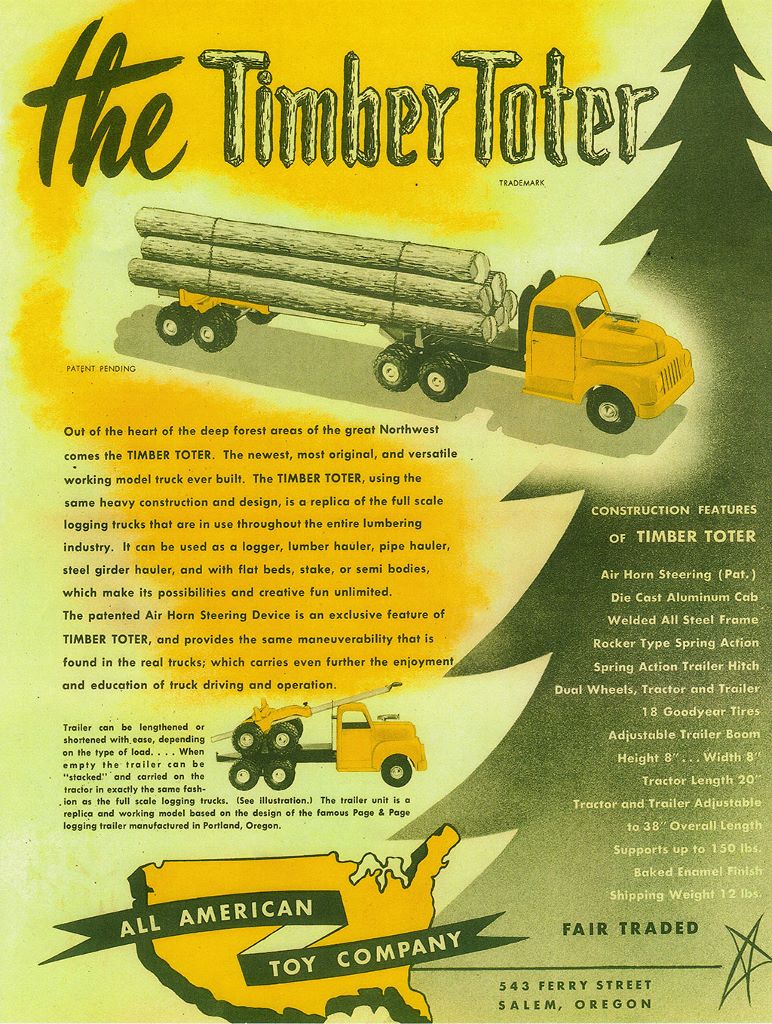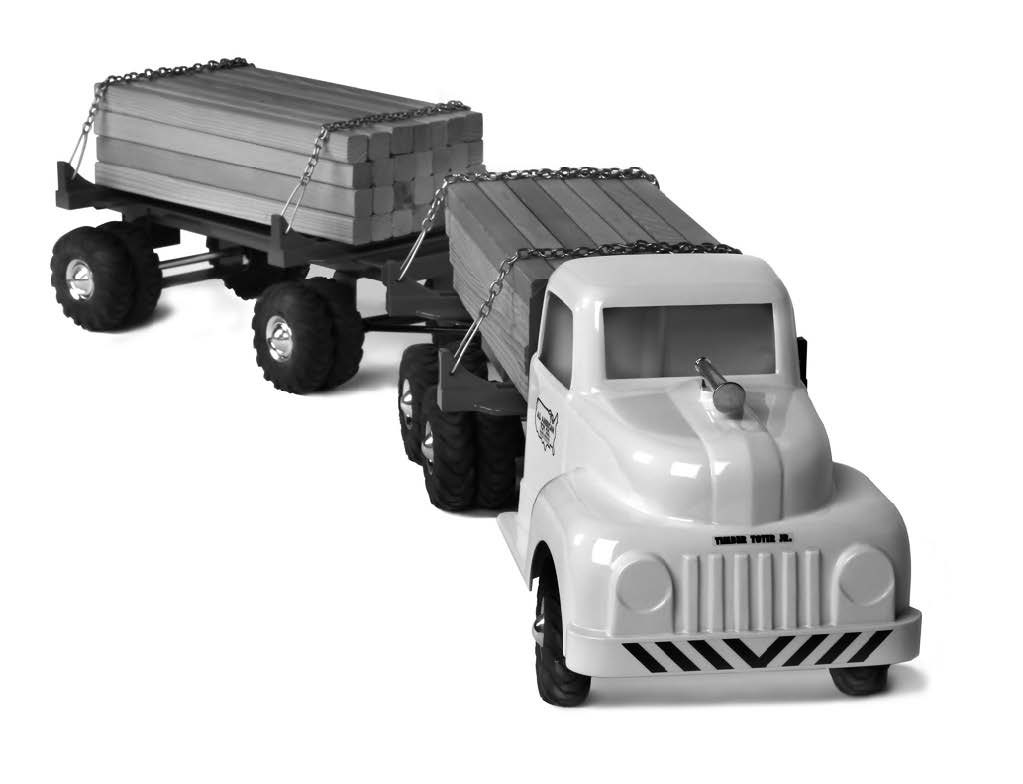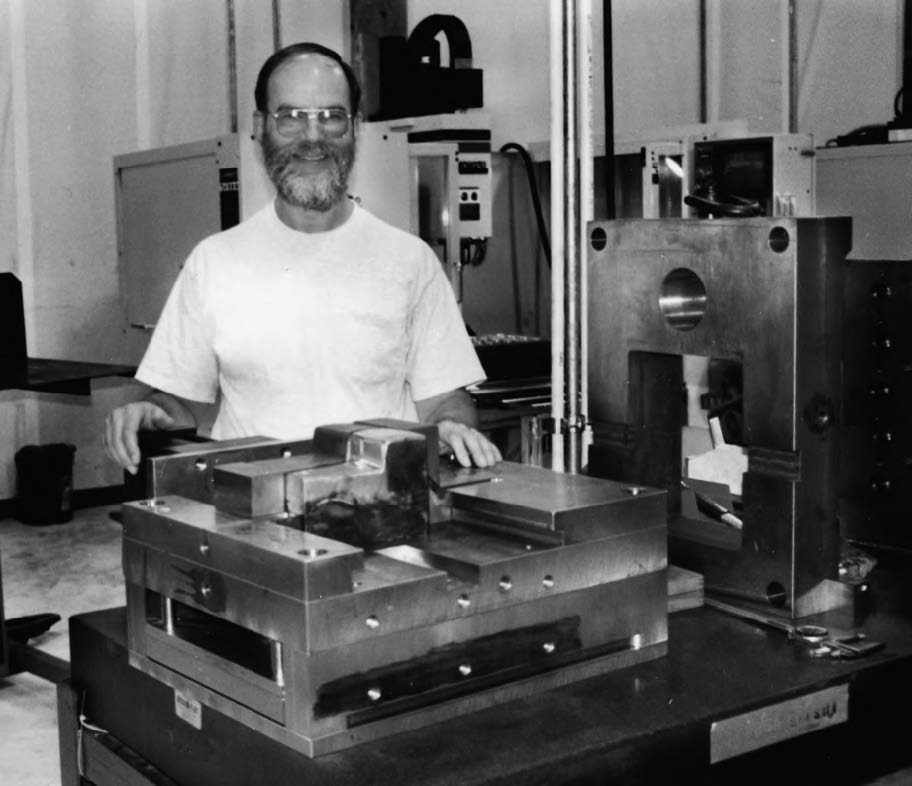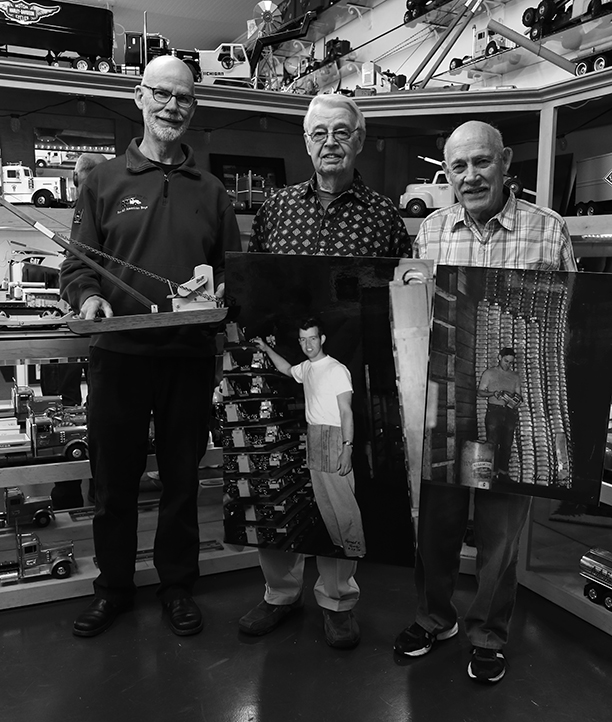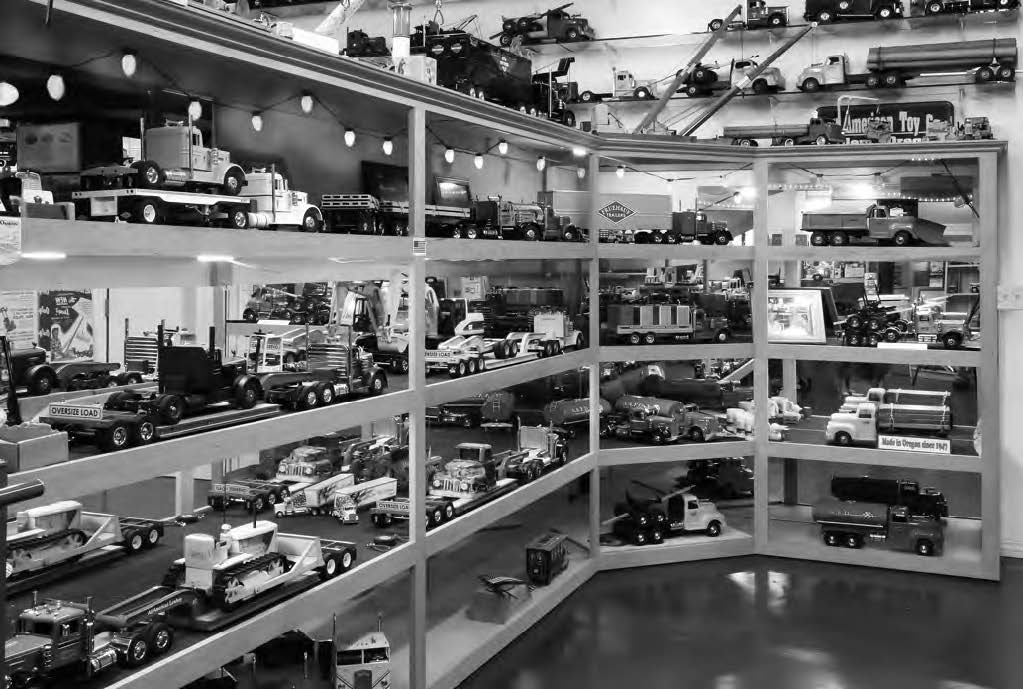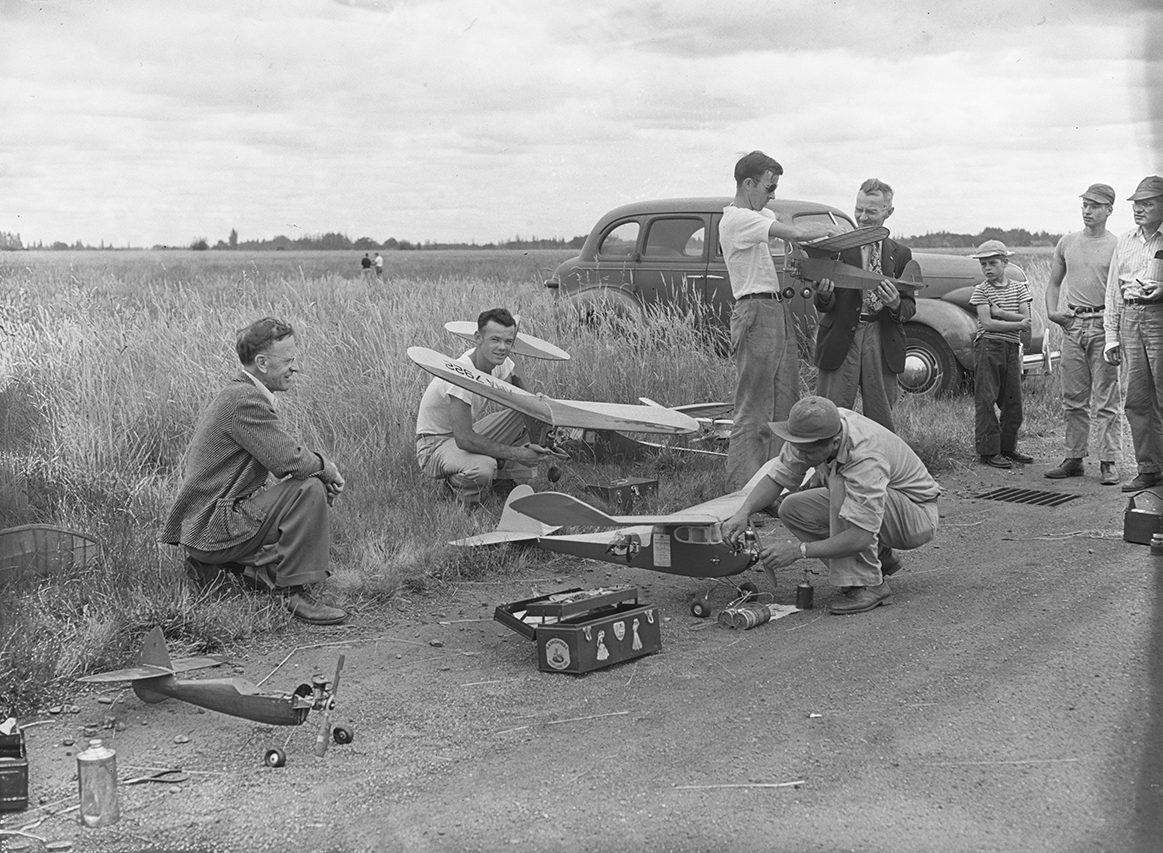More than fifteen hundred lumber mills operated in Oregon in 1947, and logging trucks rumbled past Steinke’s Truck Repair in Salem all day long on their way to the Spaulding Lumber Company on the Willamette River less than a half-mile away. Steinke’s was the birthplace of the All American Toy Company, which was founded in 1947 by Clay and Beth Steinke. The company’s toy trucks were designed to withstand years of play and were built entirely in the United States, primarily in Portland and Salem.
In 1947, Steinke’s was manufacturing logging trailers and dump boxes for full-sized trucks. “One day,” the Northwest Roto Magazine reported in July 1954, “a friend who worked in a toy and hobby store told Clay Steinke that he could use a good toy dump truck to sell during the Christmas season.” Together with Homer Rue, who would become All American’s tool and die maker, Steinke began to experiment with making a rugged, durable toy for children. They started with a dump truck. As Rue later remembered: “We tried a lift cylinder but that leaked oil. Then we went to a spring-loaded release mechanism but sometimes—boom! That threw the load over the bed instead of through the gate.” They decided to start with a logging truck instead.
Timber Toter, a 1:12-scale log truck, was the first All American toy truck. At 20 inches long, 8 inches high, and 8 inches wide, the truck and trailer length could be adjusted to reach 38 inches. Shipping weight was 12 pounds. The toy trucks were made of heavy cast aluminum and welded steel frames, and they featured real Goodyear tires. But what made the Timber Toter unique was its steering mechanism: the air horn mounted on the hood turned the wheels. Clay Steinke was adamant about using parts made in the United States and, where possible, in Oregon. The trucks sold for $19.95 in outlets that ranged from the local hardware store to Meier & Frank Department Stores and the New York City Macy’s store.
Demand for the Timber Toter prompted Steinke to apply for a patent in 1949. The company invested in a steel die for casting parts, which made mass production possible. The truck cabs were cast in Portland, and the trucks were assembled in Salem. Other models were added to the All American Toy Company line. By 1954, the company was making trucks named Dyna-Dump, Utility Truck, Timber Toter Jr., Heavy Hauler, Cargo Liner, Cattle Liner, and Midget Skagit Lift ’n’ Loader. Steinke promoted the line of toys to retailers at the annual American International Toy Fair in New York City and through a nationwide network of sales representatives.
Competition from Tonka Toys in Minnesota, a manufacturer of pressed-steel toy trucks, and from the revitalized Japanese toy industry caused Steinke to close the company in 1955. It remained dormant for thirty-five years until he sold the company name, the inventory of cast aluminum truck cabs and rubber tires, and the steel die (by then rusted shut) to Bill and Ferne Hellie and their son Chip.
Instead of mass producing toys for children, the Hellies concentrated on making limited edition toy trucks for collectors and selling parts to people who wanted to restore their own vintage All American toys. But Goodyear Tire & Rubber Company was no longer manufacturing tires for toy trucks, and the Hellies could not justify the expense of making a die to cast the parts as they ran out. In 1992, the family sold the All American Toy Company to Patrick Russell, a collector and the owner of Salem Tools.
Russell continued to produce limited edition trucks, though in larger numbers than his predecessors had. The first edition of one hundred Timber Toters, made from original mid-1950s die-cast cabs, sold out within three months. The steel die that Clay Steinke and Homer Rue had made in 1949 was restored to production, and a local source was found to cast the tires. Russell continued Steinke’s practice of only using parts made in the United States, particularly in Oregon.
Five years after reviving the All American Toy Company, Russell introduced a new 1:16 scale model truck based on the 1947 Kenworth, created with the cooperation of the truck company. Limited editions of the Kenworth included a Meier & Frank box van, an oil company tanker, and even a model with gold-plated wheel rims, trim, bumper, and radiator. Russell also made model fire trucks that could be personalized with the name of a particular fire department.
During his tenure as president of the All American Toy Company, Russell produced twenty limited editions. The original style cab was modeled after a 1947 Ford and a number of Kenworth models. He also made assembly kits available for model makers so they could build their own customized trucks. An early adopter of internet technology, Russell built a website that allowed him to reach a worldwide market of collectors and model makers. In 2015, Russell sold the All American Toy Company to Paul and Kelly Cross of Dallas, Oregon, who continue to market kits and meticulously crafted model trucks.
-
![]()
Timber Toter Ad, c. 1948.
Courtesy All American Toy Co. -
![]()
Timber Toter.
Courtesy Frank Barnett
-
![Carl Trussell, Glenn Trussell, Bob Trussell, unknown man, and Leroy (last name unknown). Front row: Homer Rue and Ken Trussell.]()
Employees of All American Toy Co., 1950.
Carl Trussell, Glenn Trussell, Bob Trussell, unknown man, and Leroy (last name unknown). Front row: Homer Rue and Ken Trussell. Courtesy Frank Barnett
-
![]()
The mechanical drawings in Clay Steinke’s patent application, filed October 6, 1949..
Courtesy Frank Barnett
-
![]()
Clay Steinke inspects a shipment of 5,000 aluminum die cast truck cabs from the foundry in Portland, c. 1950.
Photograph by Homer Rue
-
![A prototype dump truck sits on the counter. The name Steinke’s appears in the window.]()
The offices of the All American Toy Co. at 543 Ferry Street SE in Salem, Oregon, ca. 1950.
A prototype dump truck sits on the counter. The name Steinke’s appears in the window. Courtesy Frank Barnett
-
![]()
A kid pulls a Timber Toter in the Silverton Centennial Parade, 1954.
Photograph by Homer Rue
-
![]()
Glenn Trussell, shop foreman, examines an inventory of Midget Skagit Lift ‘n’ Loaders, 1955.
Photograph by Homer Rue
-
![]()
The original wooden patterns used to make sand cast truck cab molds..
Courtesy Frank Barnett
-
![]()
Eleventh edition Timber Toter Jr., released in 2000 and limited to 100 trucks..
Courtesy Frank Barnett
-
![]()
Late model Timber Toters await shipment on the second floor of the All American Toy Co., Salem, Oregon, c.1955..
Photograph by Homer Rue
-
![]()
Patrick Russell in 1996 when the Kenworth dies were being made in Eugene, Oregon.
Courtesy Patrick Russell
-
![Patrick Russell, President of All American Toy Co. 1992-2015, holds a Midget Skagit Lift ‘n’ Loader; Homer Rue, tool and die maker at All American Toy Co. 1947-1950 and 1952-1955, holds a photograph of himself next to a pallet of motorized Midget Skagit Lift ‘n’ Loaders; and Glenn Trussell, shop foreman at All American Toy Co. 1949-1955, holds a photograph taken by Homer Rue showing him inspecting a die cast cab.]()
L-R: Patrick Russell, Homer Rue, and Glenn Trussell.
Patrick Russell, President of All American Toy Co. 1992-2015, holds a Midget Skagit Lift ‘n’ Loader; Homer Rue, tool and die maker at All American Toy Co. 1947-1950 and 1952-1955, holds a photograph of himself next to a pallet of motorized Midget Skagit Lift ‘n’ Loaders; and Glenn Trussell, shop foreman at All American Toy Co. 1949-1955, holds a photograph taken by Homer Rue showing him inspecting a die cast cab. Courtesy Frank Barnett
-
![]()
A display of model trucks in Russell’s toy shop, Salem Tools.
Courtesy Frank Barnett
Related Entries
-
![AJ Model Airplanes & Jim Walker]()
AJ Model Airplanes & Jim Walker
When Nevilles E. "Jim" Walker, the founder of the American Junior Aircr…
-
![Alfred Carlton Gilbert (1884-1961)]()
Alfred Carlton Gilbert (1884-1961)
A.C. Gilbert—the inventor of the Erector Set and other educational toys…
Map This on the Oregon History WayFinder
The Oregon History Wayfinder is an interactive map that identifies significant places, people, and events in Oregon history.
Further Reading
Barnett, Frank, and Martha A. Solomon. All American Toy Co. -- All American Toys for All American Boys. Salem: Barnett & Solomon, 2020.
Solomon, Martha A. "An Oral History of the All American Toy Company." Oregon Historical Quarterly 120:3 (Fall 2019).

